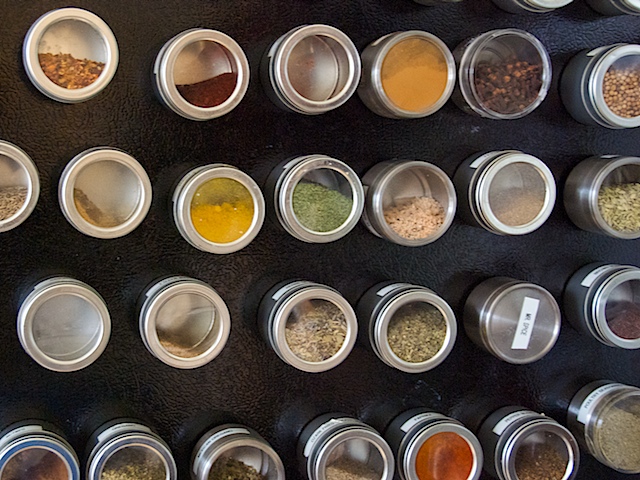
reference-image, l
(article, Hank Sawtelle)
[%pageBreakSettings nobreak=true] There are many, many spices in my spice cabinet that I just don't use that often. How long do spices last? Do they lose their zaazang while they are sitting there waiting for me? — Suzanne B., New Orleans, Louisiana I promise not to write every column about spices, but after discussing [/columns/askhank/makethemostof_saffron saffron] last time, I was on a roll and couldn't resist this follow-up. Spices do indeed lose their zaazang, Suzanne (and I want to thank you for using the correct scientific terminology). [%image reference-image float=right width=400 caption="One cook's clever spice solution: Magnetized tins on the side of the fridge."] The active ingredients in most spices (and herbs, for that matter) are aromatic compounds that add flavor to foods. The compounds tend to disperse into the air and to break down over time. Most experts (and handsome columnists) agree that ground spices lose significant aromatic effect after six months on the shelf. What can you do to slow the process? Heat, oxygen, light, and moisture are all major zaazang sponges, so shield your spices in airtight containers in the proverbial cool, dark place. Theoretically, keeping them in the freezer would work wonders, but no one does this or is ever going to, so let's just skip it. When purchasing spices, seek out the smallest containers you can find. (The only ground spice that I go through fast enough to warrant buying a standard supermarket jar is cayenne pepper.) Check your grocer's [/columns/bacon/Bulking+up "bulk aisle"], as many of them now carry spices. This is a huge benefit as you can buy quantities as small as you want, and even re-use the bags if your wife reminds you to take them with you (but enough about me). The secret weapon, though, is to buy whole spices. Unlike the wispy leaves and stems of herbs, spices usually come from sturdier plant parts like bark (cinnamon), seeds (cumin), or hardy fruits (black pepper). As long as the cell walls remain intact, the aromatic compounds survive much longer on the shelf. [[block(sidebar). h1.Featured recipes]] With whole spices, you can count on a year of shelf life, and grind your own spices to order in just a few seconds in a dedicated coffee grinder or a mortar. (Even though it takes a little longer, I prefer the mortar and pestle because it's fun, it's nearly impossible to break, and I can use it to make other stuff. Check out Asian markets for bargain-priced mortars.) The double-secret weapon is to toast whole spices before you grind them, which maximizes their aromatic punch. This is part of the normal routine in most Asian cooking, but not so much in the land of pre-ground Apple Pie Spice and Old Bay. By "toasting" I mean heating the whole spices in a pan until their aroma blankets your kitchen, and they just barely start to change color. This blooms the spices not only to release the aroma, but also to transform some of the aromatic molecules to produce a more complex flavor (similar to toasting bread). Just put your spices in a hot pan (steel, cast iron — anything without a nonstick coating, which can emit unwanted nastiness at high temps) and give them a shake every few seconds until you see the first hints of darkening. Then turn off the heat and continue to agitate for another minute or so while the pan cools for even toasting. (You don't want blackened or burned spices.) A heavier pan will hold more heat, so you'll want to get the spices out of it as soon as they're done. Denser spices take longer, so at first, toast one type at a time when building a spice blend. Once you have some experience, you'll be able to add the spices in stages to the same hot pan. For example, cinnamon bark could go in first, as it takes longer than white pepper, which takes longer than coriander, which takes longer than the cumin seeds you'd add at the very end. Make sure the spices are cool to the touch before grinding, as smashing the scorching-hot exterior into the freshly released oils can burn them, which stinks (both literally and figuratively). If you have dusty old spices lying around that you can't remember when you bought, do yourself a favor and toss them so you won't be tempted to use them. Add them to your shopping list as necessary. p(bio). Based in Portland, Oregon, Hank Sawtelle has engineering, legal, and culinary degrees.

reference-image, l